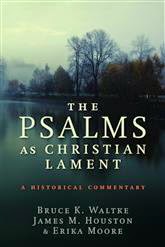The Psalms as Christian Lament, a Historical Commentary published by Eerdmans, www.eerdmans.com is a mix of each of ten “penitential psalms” with some history of what was happening when each was written and some advice from the authors as to how these psalms may ease us through our own pain and suffering. As we pray words of lament, we may also remember we are part of a whole, God’s people, who trust him while praising him and praying for his help and salvation. Our authors believe that lament is an important, though sometimes neglected, part of our prayers and they encourage readers to use lament as the psalmists did.
The authors are qualified to lead us on this journey: Bruce Waltke is Distinguished Professor of Old Testament at Knox Seminary in Fort Lauderdale and professor emeritus of biblical studies, Regent College, Vancouver; James Houston is founding principal and former chancellor of Regent College and their first professor of spiritual theology; Erika Moore is professor of Old Testament and Hebrew at Trinity School for Ministry, Ambridge, Pennsylvania.
The Psalms they study here are: 5, 6, 7, 32, 38, 39, 44, 102, 130, and 143. The authors have put together a kind of grid by which to measure each of the chosen Psalms. Each grid contains these four Parts: Voice of the Church; Voice of the Psalmist: Translation; Commentary; and Conclusion.
One of the things I especially like about this book is that it moves down through history, and theological differences are in the public eye. Opinions of various well-known theologians are introduced and critiqued as to where they fit into the over-all picture. They start with Ambrose and go on to Augustine, Erasmus, Gregory of Nyssa, Jerome, John Chrysostom, Origen, Martin Luther, John Calvin, Paul, and others. It reminds me of current discussions and differences among today’s prominent theologians, professors, clergy and lay, and how they all stir up the church from time to time.
There is so much to read and consider here, but these are a few of the gems that I hope to keep in mind and memory: “In sum, the psalm (32) is a unique mixture of penitence, wisdom, and praise. It mixes addresses to God...with addresses to the congregation.”
“Some pastoral theologians are now arguing, it is time we began to make more use of lament as a renewed focus for hope,” (p. 2).
“If, the Psalms are the mirror of the soul,” as Calvin wrote, then lament is a “major element.” In fact, one-third of the Psalter consists of “lament psalms.” There are 42 individual laments, and 16 corporate laments. One writer says that, “the predominance of laments at the very heart of Israel’s prayers means that the problems that give rise to lament are “central to the life of faith,” and “intrinsic to the very nature of faith.” I’ll buy that....
Erasmus (1469–1536), in his Conclusion on Psalm 39 suggests there are three petitions there: “Desire impels us to pray, need urges us to cry out, while tears cause us to get what we want by force.” Pleading, but unanswered, the pray-er may begin to sing “a new song,” as in “I waited patiently for the Lord and he heard me.”
Erasmus chose to tread the via media in the midst of his culture and situation, and that caused him “to lament like the psalmist for all the blows he received from both Reformers and from the conservative Catholic leaders.” (p. 155)
In his reflection on Augustine and the Psalms, Rowan Williams steps in here (p. 174) to ask and answer: “How can we understand words that imply alienation from God when they occur on the lips of Jesus? Only by reading them as spoken by the whole Christ, that is, Christ with all the members of his body. He speaks for us, makes his own the protesting or troubled way of the human being, so that his own proper and perfect prayer to the father may become ours.” And our authors add: “The believing community today can appropriate this [or any] psalm because of the finished work of Christ.”
Thus, we may pray, as in Psalm 143:
“I AM,” hear my prayer! Listen to my cry for mercy!
in your faithfulness answer me;....
—Lois Sibley
:

No comments:
Post a Comment